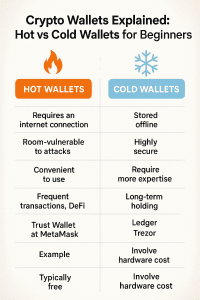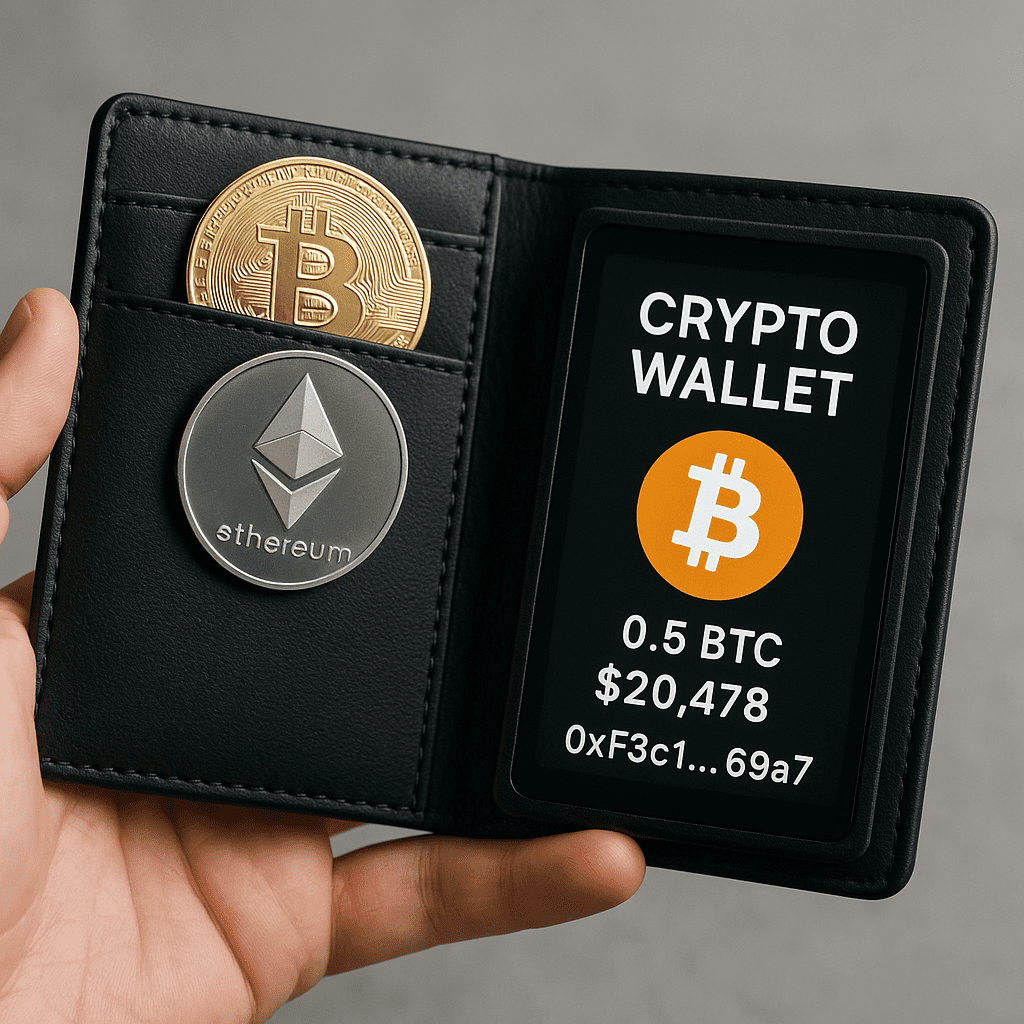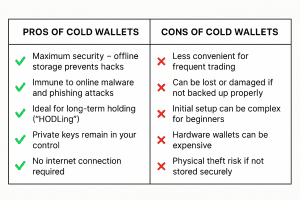A crypto wallet is an essential digital tool that allows you to store, send and receive cryptocurrency. You might think that cryptocurrency wallets store physical crypto assets, but that’s not true. Cryptocurrency wallets instead store private keys—long strings of letters and numbers—that can be paired with public keys (which are like your bank account number that you share with others to receive crypto) to enable access to cryptocurrency. It is essential because it is a credential needed to access cryptocurrency on the blockchain.
Modern cryptocurrency wallets in Kenya make blockchain easily accessible to everyone. These wallets can store private keys to many cryptocurrencies and other digital assets like NFTs (non-fungible tokens), which signify ownership. The first wallet was from Bitcoin’s developer, Satoshi Nakamoto and the second one belonged to Hal Finney. Wallets contain an address and private keys required to sign cryptocurrency transactions. Anyone who knows the private key can control the coins associated with that address; that’s why they should be kept private by the account owners.

Types of Cryptocurrency wallets in Kenya
There are two main types of wallets: custodial and noncustodial. Custodial wallets, also called online wallets, are hosted by a third-party intermediary that stores your private keys on your behalf. The third party might be a company that provides enterprise-level data security systems businesses use to preserve and secure their data.Non-custodial wallets, on the other hand, are Cryptocurrency wallets that you, as an individual, take responsibility for safeguarding your private keys. This is the type that most cryptocurrency wallets on electronic devices are. There are two subcategories of wallets: Hot and cold wallets.
-
Hot wallets
These are cryptocurrency wallets in Kenya that are connected to the internet, making them convenient for frequent transactions and quick access to funds.
This category of wallet includes most software wallets like web wallets, desktop wallets and mobile wallets. Exchange-hosted wallets are also categorized as hot wallets.
Examples of popular hot wallets
- MetaMask
- Coinbase Wallet
- Trust Wallet
- Exodus
- Zengo
Pros of hot wallets
- Hot crypto wallets are easy to set up and use and are fast when it comes to transactions, trading and accessing decentralized apps (dApps).
- They are accessible because you can manage them almost anywhere you are with an internet connection.
- Most hot wallet applications are free to download and use.
- Many hot wallets support a wide range of coins and tokens, therefore making it easy to manage DeFi tokens and other blockchain assets.
- Most of these wallets come with a seed phrase that will aid in account recovery.
- They can perform real-time trading and payments, making them ideal for active traders who need quick access to assets.
Cons of hot wallets
- Since hot wallets are always connected to the internet, they are highly vulnerable to hacking. Some other risks include malware, fake crypto wallet and device compromise.
- A stable network connection is needed to access your wallet.
- If someone gains access to your 12- or 24 word recovery phrase, they can drain your crypto wallet.
- If your phone or PC is infected by spyware or a keylogger, hackers can easily access your wallet.
- There is no way to recover funds in case hackers gain access to your wallet.
- You’re trusting a third party, and if they get hacked or go bankrupt, your funds may be at a higher risk.
When to use a hot wallet
Here are some instances where you should use these Cryptocurrency wallets in Kenya. Use it when you :
- Are a frequent crypto trader.
- Need quick access to your funds.
- Use DeFi apps or NFTs.
- Keep a small to moderate amount of crypto for daily or weekly use.
When to avoid or limit use of hot wallets
A trader should avoid the use of a hot wallet:
- If they are unable to spot phishing or scams.
- If they lack strong security habits for their crypto wallets.
- For long-term storage of large amounts of crypto.
2. Cold wallets
Also known as offline storage or cold storage, these types of cryptocurrency wallets in Kenya are those that store your private keys offline. It is considered very secure because it is not connected to the internet and they are virtually immune to online attacks like malware.
Types of cold wallets include:
- i) Hardware wallets: These are physical electronic devices resembling USB drives specifically designed to securely store private keys offline. They usually have a small screen and buttons for verifying transactions. Examples of these hardware wallets are Ledger Nano X, Ellipal Titan, Ledger Nano S Plus, Trezor Model T, KeepKey, Coldcard and BitBox02.
- ii) Paper wallet: This is a physical printout of your cryptocurrency private and public keys, often with QR codes. To spend the cryptocurrency, you will have to import the private keys into a hot wallet.
iii) Sound wallets: An unconventional method where private keys are encoded into sound waves and stored as audio files (e.g., on a CD).
- iv) Deep cold storage: This involves taking cold storage methods like paper wallets and hardware wallets and adding layers of physical security to make them extremely inaccessible
When choosing a cold wallet, it’s important to consider the amount of cryptocurrency you’re storing, your technical comfort level and how frequently you need to access your funds in your Cryptocurrency wallets in Kenya. Hardware wallets are generally recommended for most users due to their balance of security and usability.
Pros of cold wallets
- The primary advantage of these cryptocurrency wallets in Kenya is their offline nature, which makes them highly resistant to online attacks like malware and phishing.
- You have full access and control of your private keys and do not require a third party to secure funds on your behalf.
- They are ideal for holding large amounts of cryptocurrencies that you have no intention of trading frequently.
- Cold wallets eliminate the risk of losing funds due to an exchange hack or a centralized platform’s security breach of the third party.
Cons of cold wallets
- Transactions require more manual steps and are slower than with hot wallets. This makes them less suited for frequent trading.
- Cold wallets are prone to physical loss, damage or theft. If you lose one of these crypto wallets and your recovery seed phrase is not secure, you might lose access to your funds.
- Hardware wallets involve an upfront purchase fee.
- It is complex to use and set up some cold wallets and this requires in-depth knowledge of cryptocurrency security.
Examples of popular cold wallet
- Ledger
- Trezor:
- COLDCARD
- Cypherock X1
- NGRAVE Zero
- Tangem
Key security features of cold wallets
Here are some of the key security features that are incorporated with these types of Cryptocurrency wallets in Kenya.
- i) Offline private generator and storage: this security measure ensures that keys are never exposed to the internet.
- ii) Air-gapped functionality: some hardware wallets are designed in a way that they will never connect to the internet, therefore relying on QR codes and USB drives for data transfer.
iii) Secure element chips: most hardware wallets use specialized resistance chips to protect private keys and their operations.
- iv) Multi-signal (multisig) support: This allows multiple wallets to sign out on a single transaction, adding a layer of security to shared funds.
- v) Passwords and PIN codes: Most hardware wallets require a PIN code to access the device.
- vi) Biometric authentication: Some advanced wallets have fingerprint sensors as an extra security measure.
vii) Recovery seed phrase: an important backup, usually 12 or 24 words, that allows you to restore access to funds in case of loss or damage of the physical wallet. This phrase must be stored offline for security reasons.
When to use cold wallets
Use these types of cryptocurrency wallets in Kenya when:
- Planning to hold your cryptocurrencies for months or years (HODLing).
- Storing large amounts of cryptocurrencies.
- Maximizing security in your crypto wallets.
- Avoiding exchange risks.
- Gift or inheritance planning.
- Backup and disaster recovery.
Many cryptocurrency traders and investors opt for a combination of both cold wallets and hot wallets in a way that they will be using cold wallets for long-term storage of significant amounts of crypto and hot wallets for smaller amounts needed for frequent transactions. This approach balances security with convenience. It is advisable for beginners to use hot wallets.

Pro tips for crypto wallets security
Here are some pro tips for security of your Cryptocurrency wallets in Kenya, especially relevant for cryptocurrency traders and users but many apply broadly to digital wallets.
- Use hardware wallets for large holdings.
- Never share your seed phrase or private keys with anyone.
- Ensure you enable two-factor authentication (2FA).
- Keep your software updated.
- Be on the lookout for phishing.
- Use a cold wallet for long-term storage.
- Separate wallets for different users.
- Set spending and withdrawal limits for your funds.
Where to buy Cryptocurrency wallets in Kenya
This guide mainly focuses on hardware wallets since hot wallets can be downloaded online.
You can buy Cryptocurrency wallets from the following:
-
Authorised online retailers
These are the official website for the manufacturers
- i) Ledger—visit ledgercom for popular models like Ledger Nano X and Ledger Nano S Plus. They ship to Kenya .
- ii) Trezor—Visit tezor. Known for the Trezor Model One and Trezor Model T. They also ship internationally.
-
Cryptocurrency communities in Kenya
You can buy cryptocurrency wallets in Kenya from Telegram groups like Bitcoin Kenya and Crypto Kenya Official.
If you are buying from someone, it is vital to meet in person and ensure that the wallet is sealed and brand new. If it is opened, don’t make the mistake of buying it even if you are convinced.
-
Cryptocurrency businesses in Kenya
Some Nairobi-based crypto service providers like Bitlipa and localBitcoin traders may opt to sell wallets.
What to be careful about
When buying these cryptocurrency wallets in Kenya avoid fake brands and never buy used crypto wallets. If the wallet’s packaging has been opened, don’t use it.
Only buy trusted names like
- Ledger
- Trezor
- SafePal
- Keystone
FAQ
Does my crypto grow in a cold wallet?
Yes. It can increase or decrease in value while stored in cold wallets but this depends on market fluctuations and not the crypto wallets.
Which wallet can I use to withdraw USDT?
Binance, Kraken or Coinbase. They offer low transaction fees and minimal conversion rates.
What is the best crypto wallet?
Zengo—best for security.
Coinbase—best for beginners and for low costs.
MetaMask—best for Ethereum.
Exodus—best for mobile.
Electrum—best for Bitcoin.
Conclusion
Both hot and cold cryptocurrency wallets in Kenya serve important but different purposes in managing digital assets. Hot wallets are connected to the internet, making them highly convenient for frequent trading and quick transactions. However, this connectivity also makes them more vulnerable to cyber threats. Cold wallets, on the other hand, store cryptocurrencies offline, offering a much higher level of security, which makes them ideal for long-term storage and safeguarding large amounts of crypto.
While hot wallets prioritize accessibility, cold wallets focus on protection. For optimal security and flexibility, many users choose to use both: a hot wallet for daily use and a cold wallet for storing the bulk of their assets and choosing between a hot wallet and a cold wallet ultimately depends on your needs, trading habits and security preferences. For new of cryptocurrency wallets in kenya.


